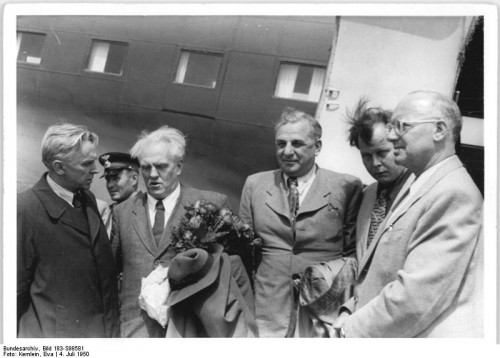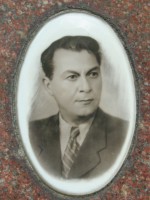Pyotr Pavlenko est un Scénariste né le 11 juillet 1899 à Saint-Pétersbourg (Russie)

Pyotr Andreyevich Pavlenko (Russian: Пётр Андре́евич Павле́нко), (born July 11, 1899, in St. Petersburg; died June 16, 1951, in Moscow), was a Soviet writer, screenwriter and war correspondent. He became a member of the CPSU in 1920.
Pavlenko was born in St Petersburg where his father was an office worker. Pavlenko studied at the Baku Polytechnic in 1919/20. In 1920 he began political work in the Red Army and continued this work later in Transcaucasia.
Career
He was part of the Soviet trade delegation in Turkey from 1924 to 1927. Pavlenko began publishing his works in 1928. His first short stories and essays, among them the collections Asian Stories (1929) and Istanbul and Turkey (1930), dealt with the non-Soviet East.
Pavlenko's travels in the Soviet East in the early 1930s furnished him with material for reevaluating and overcoming the heritage of oriental romanticism, a literary manner characteristic of the Pereval (The Pass) group of writers, with which he was associated. His new approach was reflected in the novella The Desert (1931) and the book of essays Journey to Turkmenistan (1932). In the novel The Barricades (1932), which dealt with the Paris Commune of 1871, he attained the realistic technique he'd been working toward. Defense of the homeland is the central theme of the novel In the East (books 1–2, 1936–37; film title In the Far East, 1937, in collaboration with S. Radzinsky) and of the film script for Alexander Nevsky (1938, in collaboration with Sergei Eisenstein; State Prize of the USSR, 1941). Pavlenko also wrote the film script for Yakov Sverdlov (1940; in collaboration with B. M. Levin).
Pavlenko was a war correspondent during the Soviet-Finnish War of 1939–40 and World War 2. The novel Happiness (1947; State Prize of the USSR) was inspired by his experience during the restoration of the Crimea’s economy. The hero, the Communist Voropaev, is depicted comprehensively and in depth. In collaboration with Mikheil Chiaureli, Pavlenko wrote the scripts for the films The Vow (1946; State Prize of the USSR, 1947) and The Fall of Berlin (1949; State Prize of the USSR, 1950). He also wrote three books of essays, American Impressions (1949), Young Germany and Italian Impressions (both 1951). The novella Steppe Sunlight (1949) is clear and graphic in its language and well-defined in its aim. Pavlenko’s novel Toilers of the World (partly published in 1952) was unfinished.
Later life
Pavlenko was a deputy to the third convocation of the Supreme Soviet of the USSR. He was awarded the Order of Lenin, two other orders, and several medals. He died in 1951 in Moscow and was buried in the Novodevichy Cemetery.
Source : Wikidata
Pyotr Pavlenko

Naissance 11 juillet 1899 à Saint-Pétersbourg (Russie)
Mort 16 juin 1951 (à 51 ans) à Moscou (Russie)
Récompenses Ordre de Lénine, Prix Staline, Ordre du Drapeau rouge
Mort 16 juin 1951 (à 51 ans) à Moscou (Russie)
Récompenses Ordre de Lénine, Prix Staline, Ordre du Drapeau rouge
Biographie
Early lifePavlenko was born in St Petersburg where his father was an office worker. Pavlenko studied at the Baku Polytechnic in 1919/20. In 1920 he began political work in the Red Army and continued this work later in Transcaucasia.
Career
He was part of the Soviet trade delegation in Turkey from 1924 to 1927. Pavlenko began publishing his works in 1928. His first short stories and essays, among them the collections Asian Stories (1929) and Istanbul and Turkey (1930), dealt with the non-Soviet East.
Pavlenko's travels in the Soviet East in the early 1930s furnished him with material for reevaluating and overcoming the heritage of oriental romanticism, a literary manner characteristic of the Pereval (The Pass) group of writers, with which he was associated. His new approach was reflected in the novella The Desert (1931) and the book of essays Journey to Turkmenistan (1932). In the novel The Barricades (1932), which dealt with the Paris Commune of 1871, he attained the realistic technique he'd been working toward. Defense of the homeland is the central theme of the novel In the East (books 1–2, 1936–37; film title In the Far East, 1937, in collaboration with S. Radzinsky) and of the film script for Alexander Nevsky (1938, in collaboration with Sergei Eisenstein; State Prize of the USSR, 1941). Pavlenko also wrote the film script for Yakov Sverdlov (1940; in collaboration with B. M. Levin).
Pavlenko was a war correspondent during the Soviet-Finnish War of 1939–40 and World War 2. The novel Happiness (1947; State Prize of the USSR) was inspired by his experience during the restoration of the Crimea’s economy. The hero, the Communist Voropaev, is depicted comprehensively and in depth. In collaboration with Mikheil Chiaureli, Pavlenko wrote the scripts for the films The Vow (1946; State Prize of the USSR, 1947) and The Fall of Berlin (1949; State Prize of the USSR, 1950). He also wrote three books of essays, American Impressions (1949), Young Germany and Italian Impressions (both 1951). The novella Steppe Sunlight (1949) is clear and graphic in its language and well-defined in its aim. Pavlenko’s novel Toilers of the World (partly published in 1952) was unfinished.
Later life
Pavlenko was a deputy to the third convocation of the Supreme Soviet of the USSR. He was awarded the Order of Lenin, two other orders, and several medals. He died in 1951 in Moscow and was buried in the Novodevichy Cemetery.
Le plus souvent avec
Filmographie de Pyotr Pavlenko (4 films)
Scénariste

La Chute de Berlin (1950)
, 2h47Réalisé par Mikhaïl Tchiaoureli
Origine Russie
Genres Drame, Guerre
Thèmes Politique, Politique
Acteurs Mikheil Gelovani, Boris Andreyev, Tamara Nossova, Rouben Simonov, Boris Livanov, Andrei Abrikosov
Note56%





Aliocha, le héros, s'engage dans l'Armée rouge afin de servir sa patrie et de sauver Natasha, la femme qu'il aime et qui a été déportée par les Nazis. Grâce à son courage et à son patriotisme, Aliocha pourra rencontrer Staline qui supervise le déroulement de la guerre depuis son bureau du Kremlin.

Pitsi (1946)
, 1h48Réalisé par Mikhaïl Tchiaoureli
Thèmes Politique
Acteurs Mikheil Gelovani, Sofja Vladimirovna Giatsintova, Tamara Makarova, Vasili Merkuryev, Nikolai Plotnikov
Note50%





1924. Veteran Bolshevik Petrov, a resident of Tsaritsyn, carries a letter to Vladimir Lenin, to inform him of the Kulak brigands that roam the land, spreading death and misery. The Kulaks murder him. His widow, Varvara, continues his quest, joining a group that travels to Moscow. When they arrive, they discover that Lenin is dead. In the Kremlin, Vyacheslav Molotov tells Anastas Mikoyan that now, Grigory Zinoviev, Lev Kamenev and Nikolai Bukharin will attempt to subvert the party by attacking Stalin, Lenin's devout disciple. Stalin, mourning his teacher's passing away, carries a eulogy in the funeral, calling for all attendants and all the people of the Soviet Union to vow to maintain his legacy. The people swear. Varvara sees Stalin and hands him over the blood-stained letter entitled "To Lenin".

Alexandre Nevski (1938)
, 1h52Réalisé par Sergueï Eisenstein, Dmitri Vassiliev
Origine Russie
Genres Drame, Guerre, Historique
Acteurs Nikolai Cherkasov, Andrei Abrikosov, Valentina Ivashova
Note74%





Le film retrace un événement phare de l'histoire de la Russie au XIII siècle : l’opposition du prince Alexandre Nevski à l’invasion des chevaliers teutoniques et notamment la bataille du lac Peïpous qui mit fin à leur expansion orientale.

დიადი განთიადი (1938)
, 1h13Réalisé par Mikhaïl Tchiaoureli
Genres Drame, Guerre
Thèmes Politique
Acteurs Mikheil Gelovani, Tamara Makarova, Ivan Perestiani
Note59%





In 1917, the people of the Russian Empire are no longer willing to fight Germany, but the bourgeois government of Alexander Kerensky is unwilling to defy its imperialist allies and stop the war. Only Vladimir Lenin's Bolshevik Party is resolute in calling for peace. In the front, the soldiers of one battalion elect three delegates to travel to St. Petersburg with donations the troops collected for the Pravda newspaper: Gudushauri, Panasiuk and Ershov. The three arrive in the capital and describe the horrendous conditions in which the soldiers live to Joseph Stalin, Lenin's trusted aid and colleague. They join the Bolsheviks and take part in the storming of the Winter Palace, led by Stalin and Lenin. Stalin announces that the great dawn of revolution has broken.
 Connexion
Connexion




